Jurgen (5)
By:
April 12, 2015
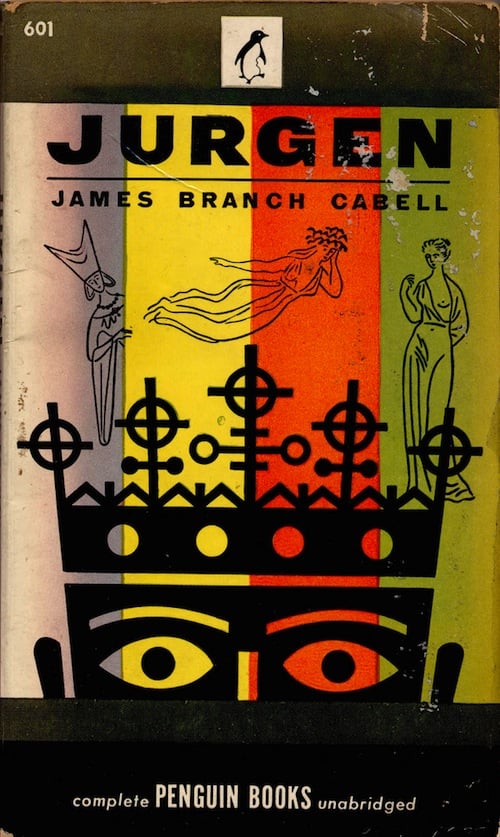
James Branch Cabell’s 1919 ironic fantasy novel Jurgen, A Comedy of Justice, the protagonist of which seduces women everywhere he travels — including into Arthurian legend and Hell itself — is (according to Aleister Crowley) one of the “epoch-making masterpieces of philosophy.” Cabell’s sardonic inversion of romantic fantasy was postmodernist avant la lettre. HiLoBooks is pleased to serialize Jurgen here at HILOBROW. Enjoy!
For now had come to Jurgen and the Centaur a gold-haired woman, clothed all in white, and walking alone. She was tall, and lovely and tender to regard: and hers was not the red and white comeliness of many ladies that were famed for beauty, but rather it had the even glow of ivory. Her nose was large and high in the bridge, her flexible mouth was not of the smallest: and yet whatever other persons might have said, to Jurgen this woman’s countenance was in all things perfect. Perhaps this was because he never saw her as she was. For certainly the color of her eyes stayed a matter never revealed to him: gray, blue or green, there was no saying: they varied as does the sea; but always these eyes were lovely and friendly and perturbing.
Jurgen remembered that: for Jurgen saw this was Count Emmerick’s second sister, Dorothy la Désirée, whom Jurgen very long ago (a many years before he met Dame Lisa and set up in business as a pawnbroker) had hymned in innumerable verses as Heart’s Desire.
“And this is the only woman whom I ever loved,” Jurgen remembered, upon a sudden. For people cannot always be thinking of these matters.
So he saluted her, with such deference as is due to a countess from a tradesman, and yet with unforgotten tremors waking in his staid body. But the strangest was yet to be seen, for he noted now that this was not a handsome woman in middle life but a young girl.
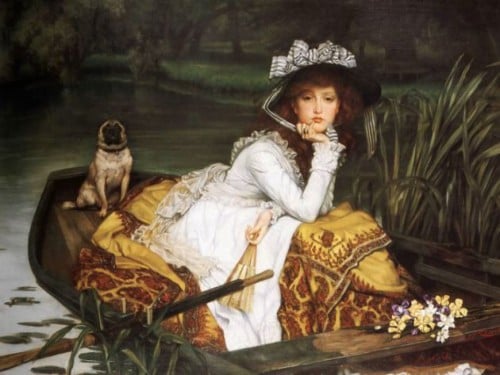
“I do not understand,” he said, aloud: “for you are Dorothy. And yet it seems to me that you are not the Countess Dorothy who is Heitman Michael’s wife.”
And the girl tossed her fair head, with that careless lovely gesture which the Countess had forgotten. “Heitman Michael is well enough, for a nobleman, and my brother is at me day and night to marry the man: and certainly Heitman Michael’s wife will go in satin and diamonds at half the courts of Christendom, with many lackeys to attend her. But I am not to be thus purchased.”
“So you told a boy that I remember, very long ago. Yet you married Heitman Michael, for all that, and in the teeth of a number of other fine declarations.”
“Oh, no, not I,” said this Dorothy, wondering. “I never married anybody. And Heitman Michael has never married anybody, either, old as he is. For he is twenty-eight, and looks every day of it! But who are you, friend, that have such curious notions about me?”
“That question I will answer, just as though it were put reasonably. For surely you perceive I am Jurgen.”
“I never knew but one Jurgen. And he is a young man, barely come of age —” Then as she paused in speech, whatever was the matter upon which this girl now meditated, her cheeks were tenderly colored by the thought of it, and in her knowledge of this thing her eyes took infinite joy.
And Jurgen understood. He had come back somehow to the Dorothy whom he had loved: but departed, and past overtaking by the fleet hoofs of centaurs, was the boy who had once loved this Dorothy, and who had rhymed of her as his Heart’s Desire: and in the garden there was of this boy no trace. Instead, the girl was talking to a staid and paunchy pawnbroker, of forty-and-something.
So Jurgen shrugged, and looked toward the Centaur: but Nessus had discreetly wandered away from them, in search of four-leafed clovers. Now the east had grown brighter, and its crimson began to be colored with gold.
“Yes, I have heard of this other Jurgen,” says the pawnbroker. “Oh, Madame Dorothy, but it was he that loved you!”
“No more than I loved him. Through a whole summer have I loved Jurgen.”
And the knowledge that this girl spoke a wondrous truth was now to Jurgen a joy that was keen as pain. And he stood motionless for a while, scowling and biting his lips.
“I wonder how long the poor devil loved you! He also loved for a whole summer, it may be. And yet again, it may be that he loved you all his life. For twenty years and for more than twenty years I have debated the matter: and I am as well informed as when I started.”
“But, friend, you talk in riddles.”
“Is not that customary when age talks with youth? For I am an old fellow, in my forties: and you, as I know now, are near eighteen, — or rather, four months short of being eighteen, for it is August. Nay, more, it is the August of a year I had not looked ever to see again; and again Dom Manuel reigns over us, that man of iron whom I saw die so horribly. All this seems very improbable.”
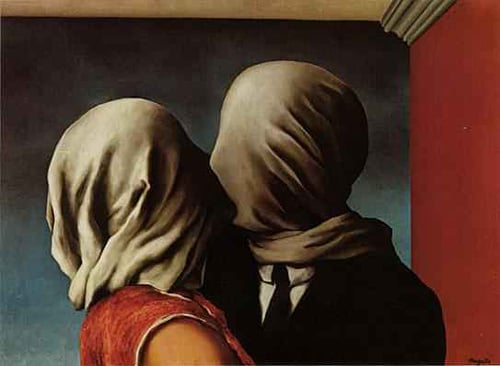
Then Jurgen meditated for a while. He shrugged.
“Well, and what could anybody expect me to do about it? Somehow it has befallen that I, who am but the shadow of what I was, now walk among shadows, and we converse with the thin intonations of dead persons. For, Madame Dorothy, you who are not yet eighteen, in this same garden there was once a boy who loved a girl, with such love as it puzzles me to think of now. I believe that she loved him. Yes, certainly it is a cordial to the tired and battered heart which nowadays pumps blood for me, to think that for a little while, for a whole summer, these two were as brave and comely and clean a pair of sweethearts as the world has known.”
Thus Jurgen spoke. But his thought was that this was a girl whose equal for loveliness and delight was not to be found between two oceans. Long and long ago that doubtfulness of himself which was closer to him than his skin had fretted Jurgen into believing the Dorothy he had loved was but a piece of his imaginings. But certainly this girl was real. And sweet she was, and innocent she was, and light of heart and feet, beyond the reach of any man’s inventiveness. No, Jurgen had not invented her; and it strangely contented him to know as much.
“Tell me your story, sir,” says she, “for I love all romances.”
“Ah, my dear child, but I cannot tell you very well of just what happened. As I look back, there is a blinding glory of green woods and lawns and moonlit nights and dance music and unreasonable laughter. I remember her hair and eyes, and the curving and the feel of her red mouth, and once when I was bolder than ordinary — But that is hardly worth raking up at this late day. Well, I see these things in memory as plainly as I now seem to see your face: but I can recollect hardly anything she said. Perhaps, now I think of it, she was not very intelligent, and said nothing worth remembering. But the boy loved her, and was happy, because her lips and heart were his, and he, as the saying is, had plucked a diamond from the world’s ring. True, she was a count’s daughter and the sister of a count: but in those days the boy quite firmly intended to become a duke or an emperor or something of that sort, so the transient discrepancy did not worry them.”
“I know. Why, Jurgen is going to be a duke, too,” says she, very proudly, “though he did think, a great while ago, before he knew me, of being a cardinal, on account of the robes. But cardinals are not allowed to marry, you see — And I am forgetting your story, too! What happened then?”
“They parted in September — with what vows it hardly matters now — and the boy went into Gâtinais, to win his spurs under the old Vidame de Soyecourt. And presently — oh, a good while before Christmas! — came the news that Dorothy la Désirée had married rich Heitman Michael.”
“But that is what I am called! And as you know, there is a Heitman Michael who is always plaguing me. Is that not strange! for you tell me all this happened a great while ago.”
“Indeed, the story is very old, and old it was when Methuselah was teething. There is no older and more common story anywhere. As the sequel, it would be heroic to tell you this boy’s life was ruined. But I do not think it was. Instead, he had learned all of a sudden that which at twenty-one is heady knowledge. That was the hour which taught him sorrow and rage, and sneering, too, for a redemption. Oh, it was armor that hour brought him, and a humor to use it, because no woman now could hurt him very seriously. No, never any more!”
“Ah, the poor boy!” she said, divinely tender, and smiling as a goddess smiles, not quite in mirth.
“Well, women, as he knew by experience now, were the pleasantest of playfellows. So he began to play. Rampaging through the world he went in the pride of his youth and in the armor of his hurt. And songs he made for the pleasure of kings, and sword-play he made for the pleasure of men, and a whispering he made for the pleasure of women, in places where renown was, and where he trod boldly, giving pleasure to everybody, in those fine days. But the whispering, and all that followed the whispering, was his best game, and the game he played for the longest while, with many brightly colored playmates who took the game more seriously than he did. And their faith in the game’s importance, and in him and his high-sounding nonsense, he very often found amusing: and in their other chattels too he took his natural pleasure. Then, when he had played sufficiently, he held a consultation with divers waning appetites; and he married the handsome daughter of an estimable pawnbroker in a fair line of business. And he lived with his wife very much as two people customarily live together. So, all in all, I would not say his life was ruined.”
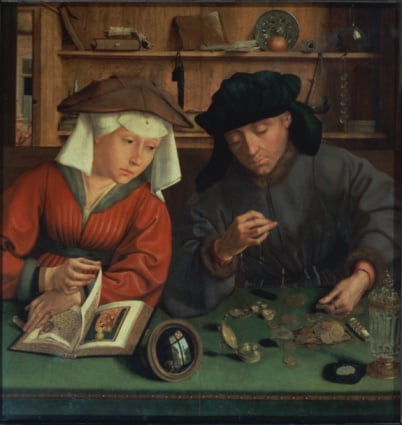
“Why, then, it was,” said Dorothy. She stirred uneasily, with an impatient sigh; and you saw that she was vaguely puzzled. “Oh, but somehow I think you are a very horrible old man: and you seem doubly horrible in that glittering queer garment you are wearing.”
“No woman ever praised a woman’s handiwork, and each of you is particularly severe upon her own. But you are interrupting the saga.”
“I do not see” — and those large bright eyes of which the color was so indeterminable and so dear to Jurgen, seemed even larger now — “but I do not see how there could well be any more.”
“Still, human hearts survive the benediction of the priest, as you may perceive any day. This man, at least, inherited his father-in-law’s business, and found it, quite as he had anticipated, the fittest of vocations for a cashiered poet. And so, I suppose, he was content. Ah, yes; but after a while Heitman Michael returned from foreign parts, along with his lackeys, and plate, and chest upon chest of merchandise, and his fine horses, and his wife. And he who had been her lover could see her now, after so many years, whenever he liked. She was a handsome stranger. That was all. She was rather stupid. She was nothing remarkable, one way or another. This respectable pawnbroker saw that quite plainly: day by day he writhed under the knowledge. Because, as I must tell you, he could not retain composure in her presence, even now. No, he was never able to do that.”
The girl somewhat condensed her brows over this information. “You mean that he still loved her. Why, but of course!”
“My child,” says Jurgen, now with a reproving forefinger, “you are an incurable romanticist. The man disliked her and despised her. At any event, he assured himself that he did. Well, even so, this handsome stupid stranger held his eyes, and muddled his thoughts, and put errors into his accounts: and when he touched her hand he did not sleep that night as he was used to sleep. Thus he saw her, day after day. And they whispered that this handsome and stupid stranger had a liking for young men who aided her artfully to deceive her husband: but she never showed any such favor to the respectable pawnbroker. For youth had gone out of him, and it seemed that nothing in particular happened. Well, that was his saga. About her I do not know. And I shall never know! But certainly she got the name of deceiving Heitman Michael with two young men, or with five young men it might be, but never with a respectable pawnbroker.”
“I think that is an exceedingly cynical and stupid story,” observed the girl. “And so I shall be off to look for Jurgen. For he makes love very amusingly,” says Dorothy, with the sweetest, loveliest meditative smile that ever was lost to heaven.
And a madness came upon Jurgen, there in the garden between dawn and sunrise, and a disbelief in such injustice as now seemed incredible.
“No, Heart’s Desire,” he cried, “I will not let you go. For you are dear and pure and faithful, and all my evil dream, wherein you were a wanton and be-fooled me, was not true. Surely, mine was a dream that can never be true so long as there is any justice upon earth. Why, there is no imaginable God who would permit a boy to be robbed of that which in my evil dream was taken from me!”
“And still I cannot understand your talking, about this dream of yours — !”
“Why, it seemed to me I had lost the most of myself; and there was left only a brain which played with ideas, and a body that went delicately down pleasant ways. And I could not believe as my fellows believed, nor could I love them, nor could I detect anything in aught they said or did save their exceeding folly: for I had lost their cordial common faith in the importance of what use they made of half-hours and months and years; and because a jill-flirt had opened my eyes so that they saw too much, I had lost faith in the importance of my own actions, too. There was a little time of which the passing might be made endurable; beyond gaped unpredictable darkness: and that was all there was of certainty anywhere. Now tell me, Heart’s Desire, but was not that a foolish dream? For these things never happened. Why, it would not be fair if these things ever happened!”
And the girl’s eyes were wide and puzzled and a little frightened. “I do not understand what you are saying: and there is that about you which troubles me unspeakably. For you call me by the name which none but Jurgen used, and it seems to me that you are Jurgen; and yet you are not Jurgen.”
“But I am truly Jurgen. And look you, I have done what never any man has done before! For I have won back to that first love whom every man must lose, no matter whom he marries. I have come back again, passing very swiftly over the grave of a dream and through the malice of time, to my Heart’s Desire! And how strange it seems that I did not know this thing was inevitable!”
“Still, friend, I do not understand you.”
“Why, but I yawned and fretted in preparation for some great and beautiful adventure which was to befall me by and by, and dazedly I toiled forward. Whereas behind me all the while was the garden between dawn and sunrise, and therein you awaited me! Now assuredly, the life of every man is a quaintly builded tale, in which the right and proper ending comes first. Thereafter time runs forward, not as schoolmen fable in a straight line, but in a vast closed curve, returning to the place of its starting. And it is by a dim foreknowledge of this, by some faint prescience of justice and reparation being given them by and by, that men have heart to live. For I know now that I have always known this thing. What else was living good for unless it brought me back to you?”
But the girl shook her small glittering head, very sadly. “I do not understand you, and I fear you. For you talk foolishness and in your face I see the face of Jurgen as one might see the face of a dead man drowned in muddy water.”
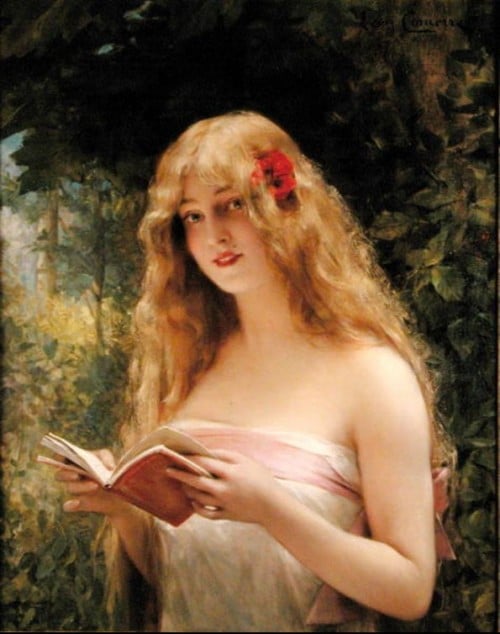
“Yet am I truly Jurgen, and, as it seems to me, for the first time since we were parted. For I am strong and admirable — even I, who sneered and played so long, because I thought myself a thing of no worth at all. That which has been since you and I were young together is as a mist that passes: and I am strong and admirable, and all my being is one vast hunger for you, my dearest, and I will not let you go, for you, and you alone, are my Heart’s Desire.”
Now the girl was looking at him very steadily, with a small puzzled frown, and with her vivid young soft lips a little parted. And all her tender loveliness was glorified by the light of a sky that had turned to dusty palpitating gold.
“Ah, but you say that you are strong and admirable: and I can only marvel at such talking. For I see that which all men see.”
And then Dorothy showed him the little mirror which was attached to the long chain of turquoise matrix about her neck: and Jurgen studied the frightened foolish aged face that he found in the mirror.
Thus drearily did sanity return to Jurgen: and his flare of passion died, and the fever and storm and the impetuous whirl of things was ended, and the man was very weary. And in the silence he heard the piping cry of a bird that seemed to seek for what it could not find.
“Well, I am answered,” said the pawnbroker: “and yet I know that this is not the final answer. Dearer than any hope of heaven was that moment when awed surmises first awoke as to the new strange loveliness which I had seen in the face of Dorothy. It was then I noted the new faint flush suffusing her face from chin to brow so often as my eyes encountered and found new lights in the shining eyes which were no longer entirely frank in meeting mine. Well, let that be, for I do not love Heitman Michael’s wife.
“It is a grief to remember how we followed love, and found his service lovely. It is bitter to recall the sweetness of those vows which proclaimed her mine eternally, — vows that were broken in their making by prolonged and unforgotten kisses. We used to laugh at Heitman Michael then; we used to laugh at everything. Thus for a while, for a whole summer, we were as brave and comely and clean a pair of sweethearts as the world has known. But let that be, for I do not love Heitman Michael’s wife.
“Our love was fair but short-lived. There is none that may revive him since the small feet of Dorothy trod out this small love’s life. Yet when this life of ours too is over — this parsimonious life which can allow us no more love for anybody, — must we not win back, somehow, to that faith we vowed against eternity? and be content again, in some fair-colored realm? Assuredly I think this thing will happen. Well, but let that be, for I do not love Heitman Michael’s wife.”
“Why, this is excellent hearing,” observed Dorothy, “because I see that you are converting your sorrow into the raw stuff of verses. So I shall be off to look for Jurgen, since he makes love quite otherwise and far more amusingly.”
And again, whatever was the matter upon which this girl now meditated, her cheeks were tenderly colored by the thought of it, and in her knowledge of this thing her eyes took infinite joy.
Thus it was for a moment only: for she left Jurgen now, with the friendliest light waving of her hand; and so passed from him, not thinking of this old fellow any longer, as he could see, even in the instant she turned from him. And she went toward the dawn, in search of that young Jurgen whom she, who was perfect in all things, had loved, though only for a little while, not undeservedly.
Footnotes from Notes on Jurgen (1928), by James P. Cover — with additional comments from the creators of this website; rewritten, in some instances, by HiLoBooks.
Dorothy la Désirée — This was Dom Manuel’s third child. She plays a prominent part in this book only.
Dom Manuel — Dom Manuel was the legendary redeemer of Poictesme, whose life history is set forth in Figures of Earth, and whose metamorphosis from a rather fallible human being to a holy redeemer is described in The Silver Stallion.
Gâtinais — Gâtinais was an ancient province of central France, the capital of which was Montargis. It is now a part of the department of Loiret.
Vidame de Soyecourt — The descendants of this nobleman appear in other books by Mr. Cabell as Princes of Gâtinais. In Gallantry, Louis de Soyecourt becomes Grand Duke of Noumaria and, in one of Kennaston’s dreams in The Cream of the Jest, goes bravely to his death on the guillotine during the French Revolution. In The High Place, Antoine de Soyecourt is a second in the fraternal duel in which Florian kills Raoul.
RADIUM AGE SCIENCE FICTION: “Radium Age” is HILOBROW’s name for the 1904–33 era, which saw the discovery of radioactivity, the revelation that matter itself is constantly in movement — a fitting metaphor for the first decades of the 20th century, during which old scientific, religious, political, and social certainties were shattered. This era also saw the publication of genre-shattering writing by Edgar Rice Burroughs, Sax Rohmer, E.E. “Doc” Smith, Jack London, Arthur Conan Doyle, Aldous Huxley, Olaf Stapledon, Karel Čapek, H.P. Lovecraft, Charlotte Perkins Gilman, Yevgeny Zamyatin, Philip Gordon Wylie, and other pioneers of post-Verne/Wells, pre-Golden Age “science fiction.” More info here.
READ GORGEOUS PAPERBACKS: HiLoBooks has reissued the following 10 obscure but amazing Radium Age science fiction novels in beautiful print editions: Jack London’s The Scarlet Plague, Rudyard Kipling’s With the Night Mail (and “As Easy as A.B.C.”), Arthur Conan Doyle’s The Poison Belt, H. Rider Haggard’s When the World Shook, Edward Shanks’ The People of the Ruins, William Hope Hodgson’s The Night Land, J.D. Beresford’s Goslings, E.V. Odle’s The Clockwork Man, Cicely Hamilton’s Theodore Savage, and Muriel Jaeger’s The Man with Six Senses. For more information, visit the HiLoBooks homepage.
SERIALIZED BY HILOBOOKS: Jack London’s The Scarlet Plague | Rudyard Kipling’s With the Night Mail (and “As Easy as A.B.C.”) | Arthur Conan Doyle’s The Poison Belt | H. Rider Haggard’s When the World Shook | Edward Shanks’ The People of the Ruins | William Hope Hodgson’s The Night Land | J.D. Beresford’s Goslings | E.V. Odle’s The Clockwork Man | Cicely Hamilton’s Theodore Savage | Muriel Jaeger’s The Man With Six Senses | Jack London’s “The Red One” | Philip Francis Nowlan’s Armageddon 2419 A.D. | Homer Eon Flint’s The Devolutionist | W.E.B. DuBois’s “The Comet” | Edgar Rice Burroughs’s The Moon Men | Charlotte Perkins Gilman’s Herland | Sax Rohmer’s “The Zayat Kiss” | Eimar O’Duffy’s King Goshawk and the Birds | Frances Hodgson Burnett’s The Lost Prince | Morley Roberts’s The Fugitives | Helen MacInnes’s The Unconquerable | Geoffrey Household’s Watcher in the Shadows | William Haggard’s The High Wire | Hammond Innes’s Air Bridge | James Branch Cabell’s Jurgen | John Buchan’s “No Man’s Land” | John Russell’s “The Fourth Man” | E.M. Forster’s “The Machine Stops” | John Buchan’s Huntingtower | Arthur Conan Doyle’s When the World Screamed | Victor Bridges’ A Rogue By Compulsion | Jack London’s The Iron Heel | H. De Vere Stacpoole’s The Man Who Lost Himself | P.G. Wodehouse’s Leave It to Psmith | Richard Connell’s “The Most Dangerous Game” | Houdini and Lovecraft’s “Imprisoned with the Pharaohs” | Arthur Conan Doyle’s “The Sussex Vampire.”
ORIGINAL FICTION: HILOBROW has serialized three novels: James Parker’s The Ballad of Cocky The Fox (“a proof-of-concept that serialization can work on the Internet” — The Atlantic); Karinne Keithley Syers’s Linda Linda Linda (which includes original music); and Robert Waldron’s roman à clef The School on the Fens. We also publish original stories and comics. These include: Matthew Battles’s stories “Gita Nova“, “Makes the Man,” “Imago,” “Camera Lucida,” “A Simple Message”, “Children of the Volcano”, “The Gnomon”, “Billable Memories”, “For Provisional Description of Superficial Features”, “The Dogs in the Trees”, “The Sovereignties of Invention”, and “Survivor: The Island of Dr. Moreau”; several of these later appeared in the collection The Sovereignties of Invention | Peggy Nelson’s “Mood Indigo“, “Top Kill Fail“, and “Mercerism” | Annalee Newitz’s “The Great Oxygen Race” | Flourish Klink’s Star Trek fanfic “Conference Comms” | Charlie Mitchell’s “A Fantasy Land” | Charlie Mitchell’s “Sentinels” | Joshua Glenn’s “The Lawless One”, and the mashup story “Zarathustra vs. Swamp Thing” | Adam McGovern and Paolo Leandri’s Idoru Jones comics | John Holbo’s “Sugarplum Squeampunk” | “Another Corporate Death” (1) and “Another Corporate Death” (2) by Mike Fleisch | Kathryn Kuitenbrouwer and Frank Fiorentino’s graphic novel “The Song of Otto” (excerpt) | John Holbo’s graphic novel On Beyond Zarathustra (excerpt) | “Manoj” and “Josh” by Vijay Balakrishnan | “Verge” by Chris Rossi, and his audio novel Low Priority Hero | EPIC WINS: THE ILIAD (1.408-415) by Flourish Klink | EPIC WINS: THE KALEVALA (3.1-278) by James Parker | EPIC WINS: THE ARGONAUTICA (2.815-834) by Joshua Glenn | EPIC WINS: THE MYTH OF THE ELK by Matthew Battles | TROUBLED SUPERHUMAN CONTEST: Charles Pappas, “The Law” | CATASTROPHE CONTEST: Timothy Raymond, “Hem and the Flood” | TELEPATHY CONTEST: Rachel Ellis Adams, “Fatima, Can You Hear Me?” | OIL SPILL CONTEST: A.E. Smith, “Sound Thinking | LITTLE NEMO CAPTION CONTEST: Joe Lyons, “Necronomicon” | SPOOKY-KOOKY CONTEST: Tucker Cummings, “Well Marbled” | INVENT-A-HERO CONTEST: TG Gibbon, “The Firefly” | FANFICTION CONTEST: Lyette Mercier’s “Sex and the Single Superhero”
